About
What do you associate with ‘physics’? Einstein or Newton?
Physics is a field of science that explores the fundamental laws of nature using all available means. Its scope ranges from elementary particles to the entire universe, and a major goal is to unify them under a small set of equations.
In the Department of Physics at the College of Humanities and Sciences of Nihon University, students learn a wide range of topics from the fundamentals of theory and experiment to the cutting edge. This fosters logical thinking and problem-solving skills. Additionally, students acquire computer skills and develop the ability to harness the latest technologies. Graduates have a variety of career options including engineer, programmer, mechanical designer, electronics or chemical manufacturer, educator, researcher, and public servant.
The Department of Physics at the College of Humanities and Sciences of Nihon University is a wonderful place for students who love physics to learn and build their future careers while enjoying their studies.
Education
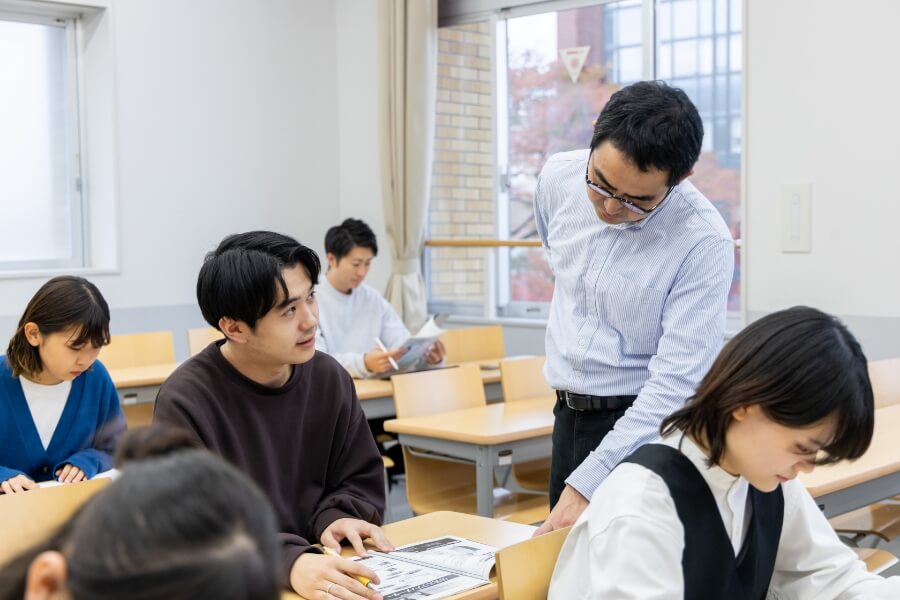
We offer a personalized education due to the relatively small student-to-faculty ratio of 70 students to 14 full-time faculty members.
We provide thorough guidance and support from the initial learning hurdles upon enrollment to everyday classes with the participation of all faculty members. The close relationship between faculty and students is the hallmark of the Department of Physics at the College of Humanities and Sciences!
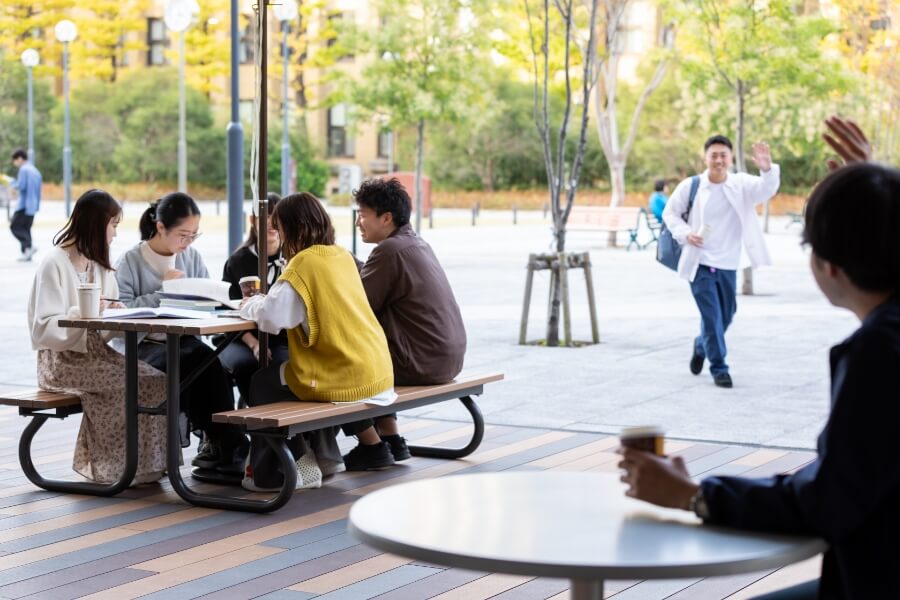
You can receive consistent education throughout the four years at the same campus. Enjoy a fulfilling student life in the green-filled city of Setagaya!
We offer a rich curriculum and job placement support unique to a campus where humanities, social sciences, and natural sciences departments gather. The campus has a male-to-female ratio of approximately 6:4, providing ample opportunities for interaction with peers of diverse personalities.
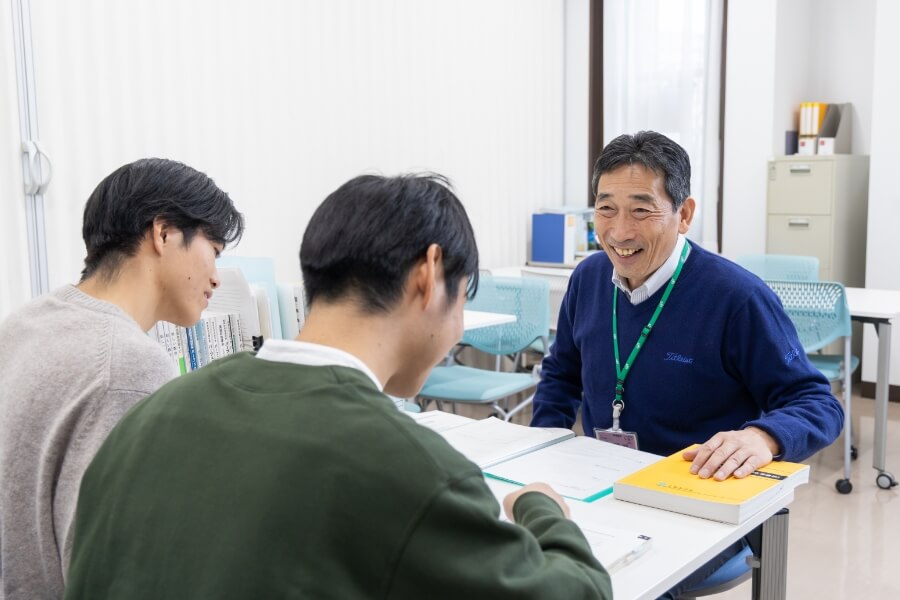
We are committed to supporting students aspiring to become engineers or researchers, as well as those aiming to become teachers at middle and high schools.
We provide a timetable that allows students to select physics specialized courses and teaching certification courses without difficulty. Additionally, at the Teacher Training Center, we offer thorough guidance on employment exam and interview preparations for becoming teachers, right up until the last minute.
Curriculum
Students learn both theoretical and experimental physics, acquiring a comprehensive understanding of physics from the fundamentals.
1st year
Students primarily study mathematics such as calculus, vectors, and matrices, alongside elementary physics subjects like mechanics. In the course “Foundation of Self-Creation,” students are divided into small groups of 6 to 8 members, where each group’s assigned faculty member provides guidance on learning and advice on daily life for the new students.
2nd & 3rd years
Students study physics subjects such as electromagnetism and thermodynamics, while also engaging in practical exercises involving numerical computations using computer programming. Additionally, their studies progress to encompass modern physics laws including relativity theory, quantum mechanics, and statistical mechanics.
4th year
Students choose to be assigned to either a theoretical or experimental research laboratory, and undertake their graduation research (Special Research A/B) as the culmination of their studies.
Features of Curriculum
Introductory courses are offered for each academic field, providing clear introductions to topics. This ensures a smooth transition from high school learning to university studies, without stumbling at the outset.
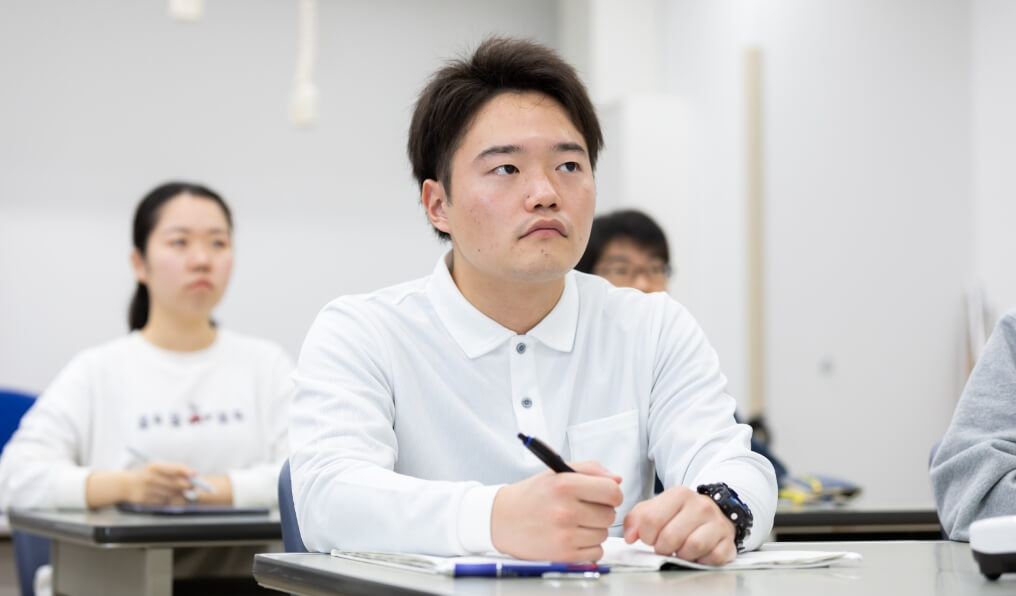
Physics Laboratory Courses
From the first to the third year, laboratory courses are provided for students. Using a variety of experimental apparatus, students conduct experiments in small groups, allowing them to directly observe and verify physical phenomena with their own eyes and hands.
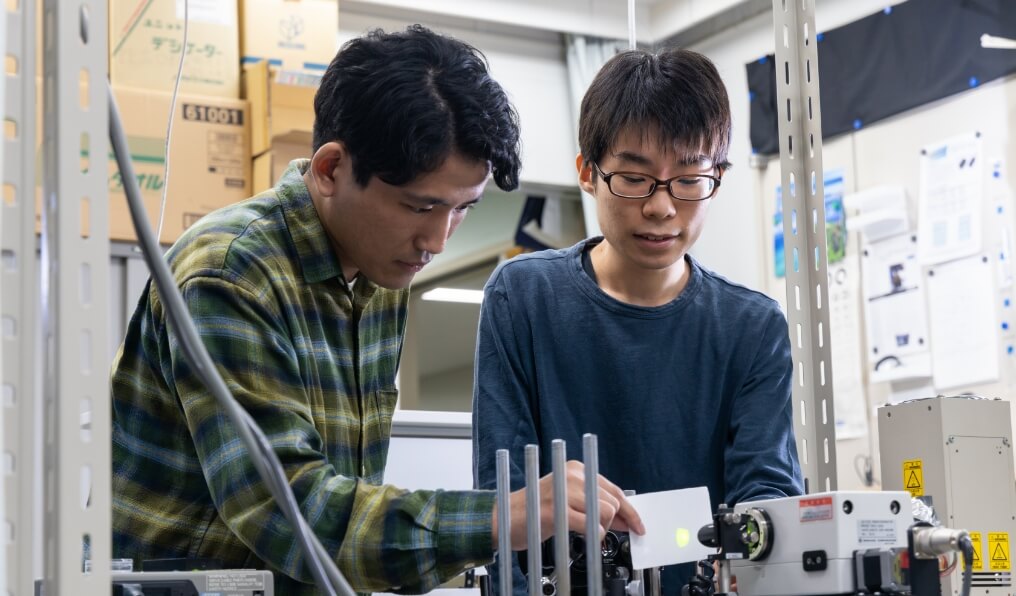
Acquisition of Qualification
Courses aimed at acquiring qualifications such as teaching certification and librarian courses are available for enrollment.
Career Paths
After graduation, career paths are diverse.
Studying physics for four years allows you to attempt to understand natural phenomena in a unified manner and develop many skills that are useful in society upon graduation. Not only do you cultivate the ability to perceive things logically and from multiple perspectives, but you also develop teamwork skills through student experiments and presentation skills through research presentations and exercise lectures. Additionally, you can acquire computer programming skills through the analysis of physical phenomena using numerical computation.
Graduates of the physics department can pursue a wide range of careers, including as engineers, programmers, mechanical designers, electronics or chemical manufacturers, educators, researchers, and public servants. Problem-solving skills based on the laws of nature are highly valued in both industry and academia and are applicable to a wide range of professions. The knowledge and skills cultivated in the physics department contribute to the ability to address important societal issues such as technological innovation, environmental problems, and energy policy.
Furthermore, physics fosters the desire to challenge unknown territories and cultivate an attitude of constantly seeking new knowledge and insights. Graduates will be able to demonstrate leadership and tackle future challenges in a field that is constantly evolving.
Career Support Center
Career Support Center provides strong job placement support tailored to students’ preferences.
We offer robust support, including approximately 3,500 consultations, interview practice sessions, and document reviews annually. In addition, we provide extensive assistance based on the selection documents and experiences of alumni collected and analyzed over more than 10 years.
We organize various events to connect students engaged in job hunting with companies, such as the “College of Humanities and Sciences Alumni Networking Events,” where students can directly hear from alumni, and the “Joint Research Meetings with Excellent Companies and Public Organizations,” where reputable companies and government agencies with recruitment records are invited.
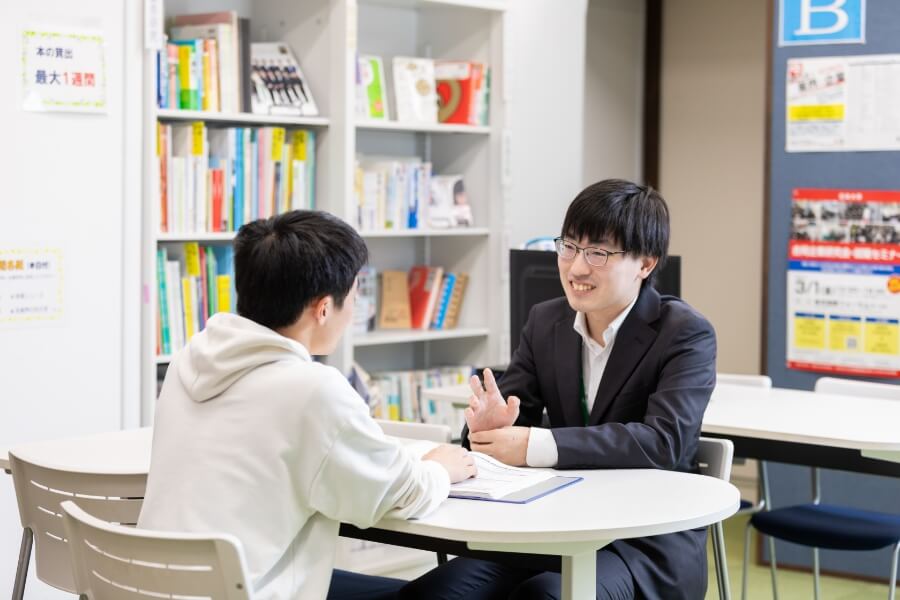
Teacher Training Center
The College of Humanities and Sciences also focuses on training teachers for middle and high schools.
The college originated from a higher normal school aimed at teacher training, and it has established a robust support system through the Teacher Training Center, covering students’ acquisition of teaching licenses to their employment exams.
In the Department of Physics, students have the opportunity to acquire teaching licenses for junior high and high school (Type 1). The College of Humanities and Sciences offers departments corresponding to all four subjects required for becoming a high school science teacher: physics, chemistry, biology, and earth science. Students can attend lectures from specialized instructors in each subject.
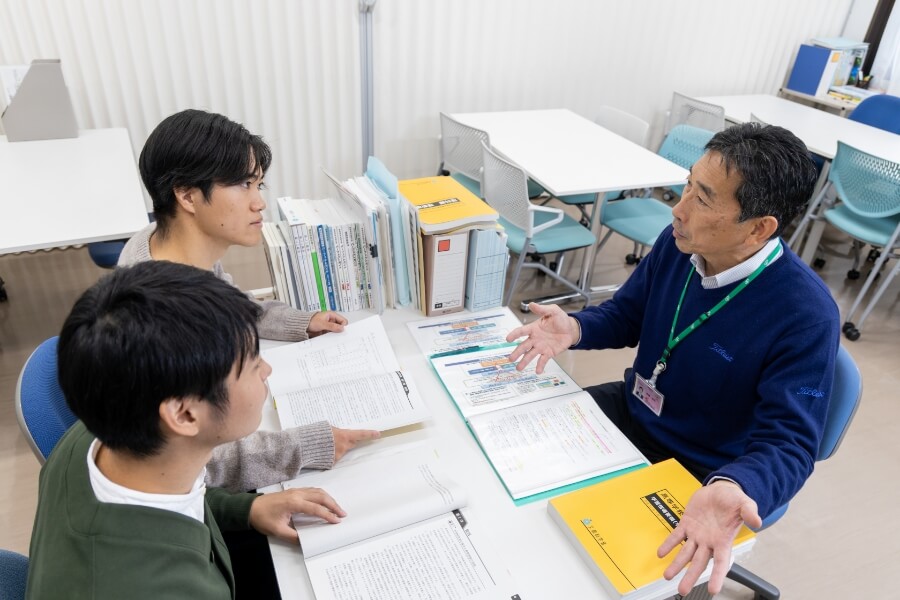
Theoretical Research Laboratories & Experimental Research Laboratories
In the graduation research, students utilize the knowledge they have acquired to conduct specialized research aimed at elucidating unresolved issues in physics. The methodologies for research differ between theoretical and experimental approaches, but regardless of the approach, the knowledge and experience gained in both theoretical and experimental studies up to the fourth year prove invaluable.
Theoretical Research Laboratories
Our research interests span from the nuclei of atoms to the far reaches of the universe.
In current theoretical physics, efforts are made to explain phenomena comprehensively, from quarks inside atomic nuclei to the entire universe, using unified equations to understand interactions such as gravity and electromagnetism. This can be considered the ultimate theory of physics.
The desire to understand nature is the driving force behind theoretical physics. Unlike studies up to high school, theoretical physics offers a realm of pure research.
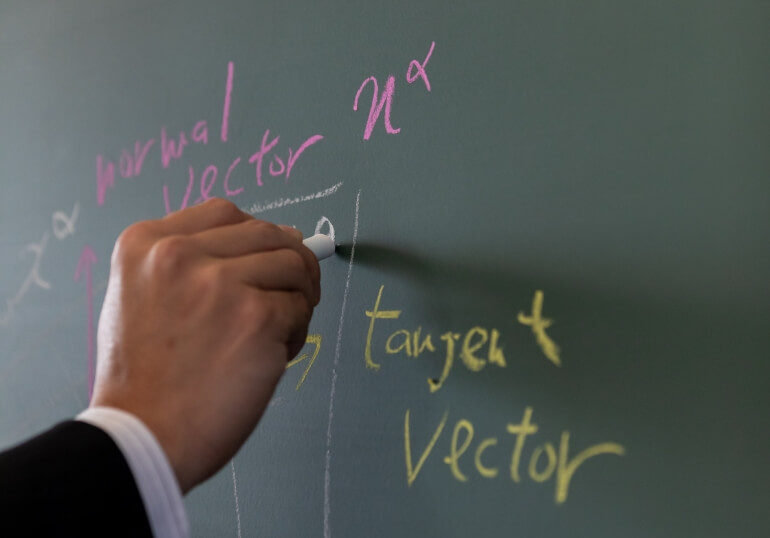
- Research Topic Examples:
- Solid state physics, Cosmology, Theory of relativity, String theory, Quantum information, Quantum computing
Faculty Members:
| Name | Field of Expertise | Web Site |
|---|---|---|
| Hiroshi Ishida | Solid State Theory | http://zwo.phys.chs.nihon-u.ac.jp/ |
| Takeshi Chiba | Gravitation and Cosmology | https://www.phys.chs.nihon-u.ac.jp/chiba/ |
| Keiju Murata | General Relativity and String Theory | https://www.phys.chs.nihon-u.ac.jp/murata/ |
| Daisuke Yamamoto | Quantum Condensed Matter Theory | https://www.phys.chs.nihon-u.ac.jp/yamamoto/ |
| Kotaro Tamaoka | Quantum Information Theory | https://sites.google.com/view/kotaro-tamaoka/ |
Experimental Research Laboratories
From ultra-high vacuum to one million atmospheres, from -270°C to several thousand degrees Celsius.
“Observation,” a method of experimental physics, is the most reliable methodology for understanding natural phenomena. The observational data obtained through experiments are definite facts about how nature behaves. Sometimes, they transcend the realms of logical thought and contemplation.
To witness the first physical observations made by humankind, daily trial and error, ideas for experimental techniques, and research strategies are indispensable. Then, when you actually manipulate things and observe new experimental results, there is an unparalleled sense of joy.
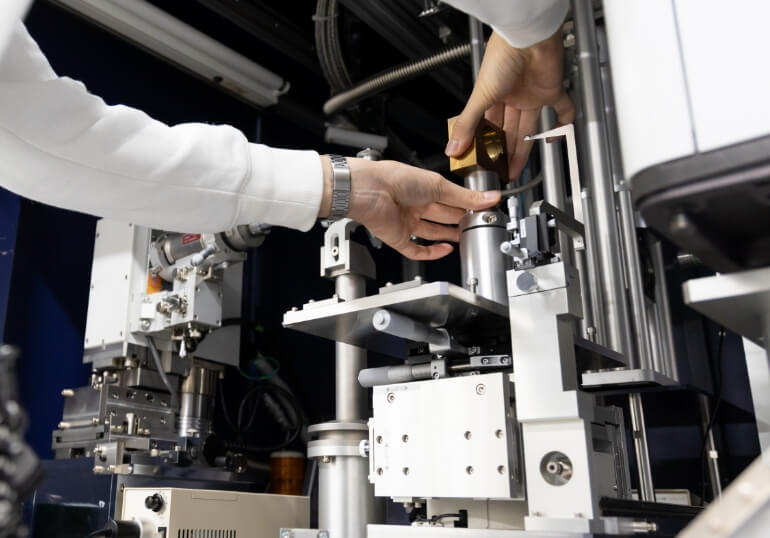
- Research Topic Examples:
- Superconductivity, Nanoscience, Material synthesis and development, Laser and optical properties, Fuel cells
Faculty Members:
| Name | Field of Expertise | Web Site |
|---|---|---|
| Hayato Kamioka | Laser and Optical Physics | https://www.phys.chs.nihon-u.ac.jp/kamioka/ |
| Ken Judai | Nanoscience | https://web.judai.jp/ |
| Hiroki Takahashi | Superconducting Materials | https://www.phys.chs.nihon-u.ac.jp/takahashi/ |
| Takuya Hashimoto | Energy Science | http://blog.livedoor.jp/hashimoto_lab/ |
| Nobuyuki Abe | Material Science | https://sites.google.com/view/abelab-chs-nihonuniv/ |
Graduate School Enrollment
The College of Humanities and Sciences is accompanied by a graduate school, and from the Department of Physics, students can internally advance to the Graduate School of Integrated Basic Sciences.
With the advancement of technology and the sophistication of society, particularly in STEM fields, there is an increasing demand for individuals with advanced expertise and research capabilities.
The Correlative Study of Physics and Chemistry major at the Graduate School of Integrated Basic Sciences offers three divisions: physics, biosciences, and chemistry. It conducts interdisciplinary education and research that transcends the boundaries of traditional disciplines. It not only cultivates highly skilled engineers and researchers but also trains high school teachers with advanced licenses.
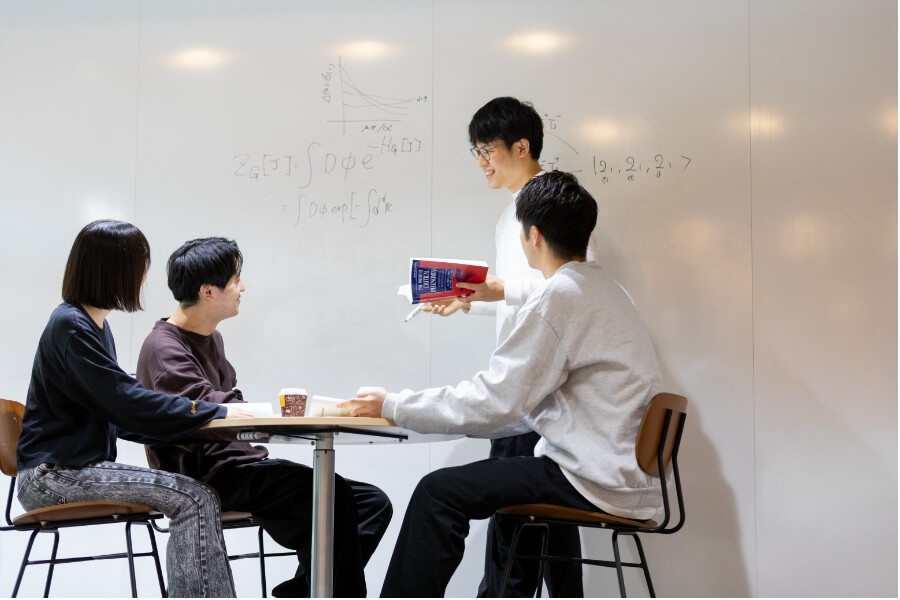
Access
Department of Physics, College of Humanities and Sciences, Nihon University
3-25-40 Sakurajosui, Setagaya-ku, Tokyo 156-8550, Japan
Access by Train:
- Keio Line / Tokyu Setagaya Line:
- Get off at Shimo-takaido Station, 8 minutes on foot.
- Keio Line:
- Get off at Sakurajosui Station (Express stops), 8 to 10 minutes on foot.
- Odakyu Line:
- Get off at Kyodo Station, 20 to 25 minutes on foot.